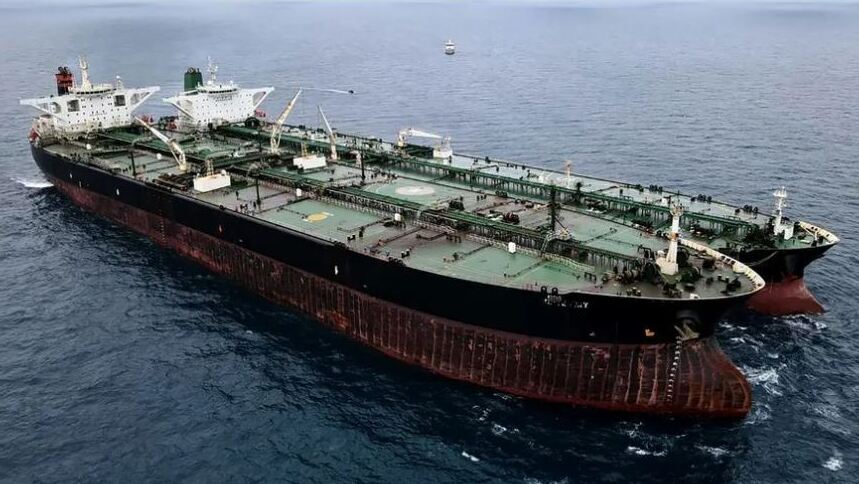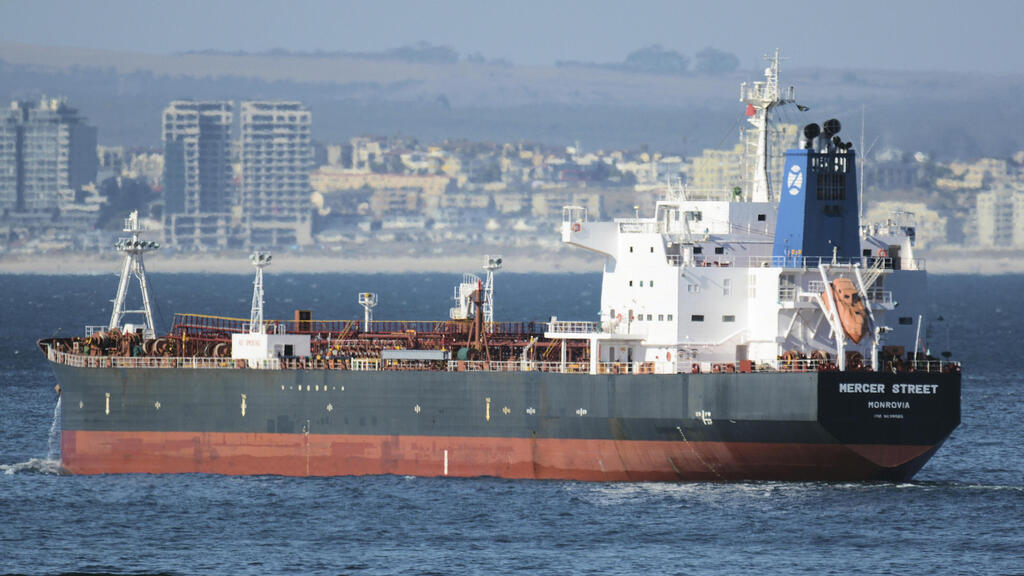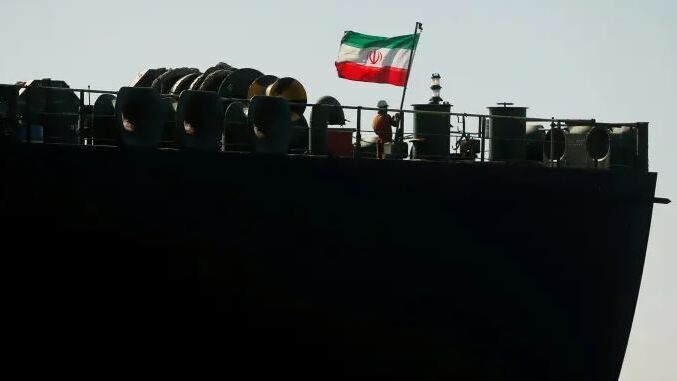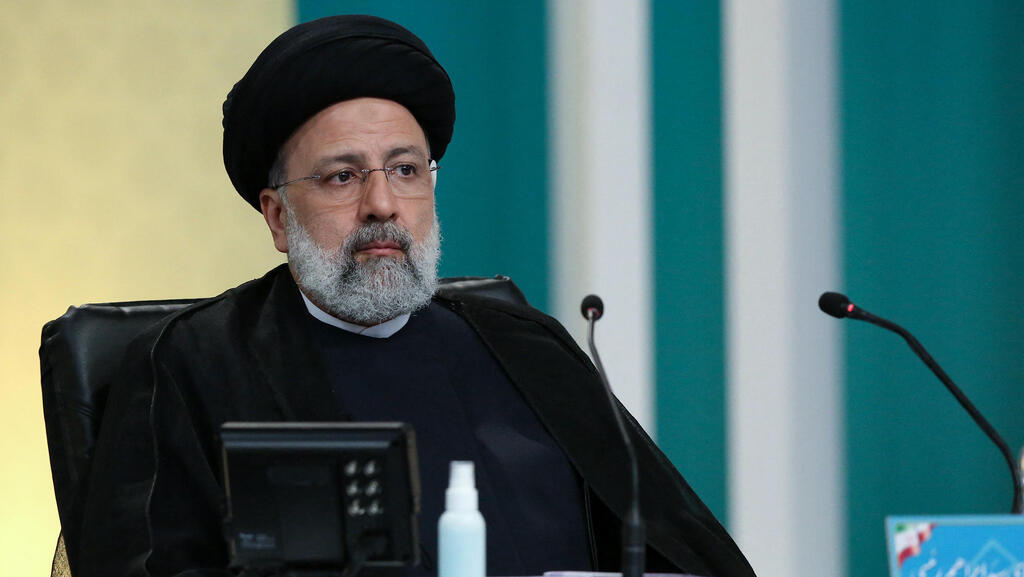Getting your Trinity Audio player ready...
On July 30, 2021, an unmanned Iranian drone attacked an Israeli-owned merchant ship in the Gulf of Oman.
This attack - which killed two crewmates of British and Romanian citizenry - took place after a series of reciprocal maritime attacks between Israel and Iran over the past year, in which Tehran attacked several Israeli-owned merchant ships - while Israel allegedly struck Iranian pirate oil tankers in the Mediterranean and the Persian Gulf.
4 View gallery


A seized Iranian tanker and Panamanian vessel suspected of illegally transferring oil in Indonesian waters on January 24, 2021.
(Photo: AFP)
The latest attack, meanwhile, put the Iranian "sanctions economy" issue on the European agenda, even for a brief moment.
However, the fact that the EU sent a representative to the inauguration ceremony of new Iranian President Ebrahim Raisi, known for his extremism and belligerence, seems to signal that the Iranian pirate oil issue has been dropped from the EU's agenda.
Iran on its part, has struggled to bring foreign currency into the country and improve its economic situation that has been deteriorating since 2018, when the Trump administration started to impose harsh economic sanctions on Islamic Republic. The measures include a ban on oil purchases from Iran alongside a long list of other financial restrictions, including a ban on foreign investment in Iran.
Iran, whose primary income resource was always oil, soon realized it must get its hands on some cash and bring food to its hungry citizens.
4 View gallery


Liberian-flagged oil tanker Mercer Street linked to an Israeli billionaire reportedly came under attack off the coast of Oman
(Photo: AP)
This understanding prompted Tehran to try and defy the U.S. sanctions in 2019, with its brand new fleet of oil tankers used in various pirated operation.
The Iranian tanker fleet includes about 143 ships, capable of carrying more than 102 million barrels of crude oil or fuel and 11.8 million barrels of liquefied natural gas daily, with a total value of over $7.7 billion per day.
Thus, with its tanker fleet, Iran began to transport oil secretly to China, North Korea, Russia, Syria, Lebanon and Venezuela - a country rich in oil reserves and, until a few years ago, was one of the largest oil exporters in the world.
U.S. sanctions on Venezuela, however, have disrupted the country's oil production capabilities, which must now be imported to support its needs.
And how does China fit into the Iranian effort?
China has seen Iran for several decades as a strategic partner in implementing its "Belt and Road Initiative" (BRI). A project led by Chinese leader Xi Jinping, to form an intercontinental trade route akin to the famed Silk Road, that would stretch from East Asia to Europe.
China has invested over $300 billion since 2003 until today in the BRI project, with many hundreds of billions more expected to be spent in the next decade.
Iran and China signed a strategic cooperation agreement in the early 2000s.
Based on this agreement, China transferred technological knowledge and production lines of weapons, aircraft and missiles to Iran. In return, Iran supplied oil, which China needed to realize its vision and economy.
Iran is China's main oil supplier and its geostrategic location, between the Caspian Sea and the Arabian Sea, is the only land bridge from Central Asia for China.
In other words, investing in Iran is also a bridge for China to be a global power and not just a regional one.
Moreover, Iran's perspective toward the United States and other Western countries, and the hostility between them, is an essential tool in the hands of China.
China, whose strategy is indirect warfare (also known as "non-contact" warfare). For China, Iran is a frontier state against the U.S. in the Persian Gulf. It draws the U.S. attention from the South China Sea, where China conducts a real naval campaign and takes over maritime territories belonging to the region's countries.
In 2019, China and Iran renewed the strategic agreement between them. It guarantees China a more significant foothold in Iran, control over intelligence gathering in Iran, and additional resources for China's use.
4 View gallery


A crew member raises the Iranian flag on Iranian oil tanker Adrian Darya 1, previously named Grace 1, as it sits anchored after the Supreme Court of the British territory lifted its detention order, in the Strait of Gibraltar
(Photo: Reuters)
As part of its strategic support, China is also assisting Iran in selling pirated oil and using the Iranian tanker fleet — the new shadow fleet — for oil-bypassing sanctions.
Over the past year, China has purchased more than 700,000 barrels of oil from Iran daily. This Chinese-sponsored oil export allows Iran to maintain regime stability and inject foreign money into the state coffers.
China is even helping Iran operate its shadow fleet so that the tankers will not be detected.
For example, the tankers transmit their incorrect location in the Automatic Identification Systems, the AIS, required by international shipping laws. More than that, the tankers were repainted, and the tankers' names were changed to cover the real identity of the tankers.
In addition, the Iranian shadow fleet tankers are changing their flag frequently. This move is backed by a global operational infrastructure set up by the Iranian Quds Force, which includes a huge array of straw companies whose tankers are registered as owned.
With the help and support of China, the Iranian cat-and-mouse game allows Iran to continue its bypassing economy, ignoring the U.S. sanctions, especially during President Joe Biden's administration that the states perceive as weak.
This is how Iran manages to inject much money into its coffers, revive its economy and continue its arms race to build offensive capabilities and complete its nuclear program, to which it is so close.
Dr. Eyal Pinko served in the Israeli Navy for 23 years, in operational, technological, and intelligence duties. He is a senior researcher and has published more than 200 articles.
Article reprinted with permission from i24NEWS


